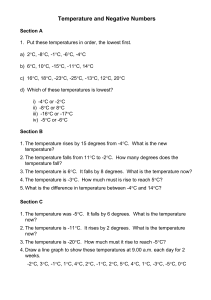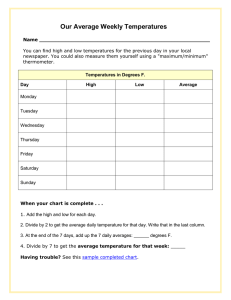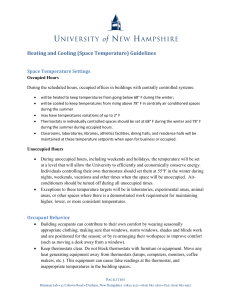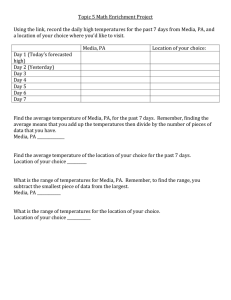Undergraduate College Temperature Policy
advertisement
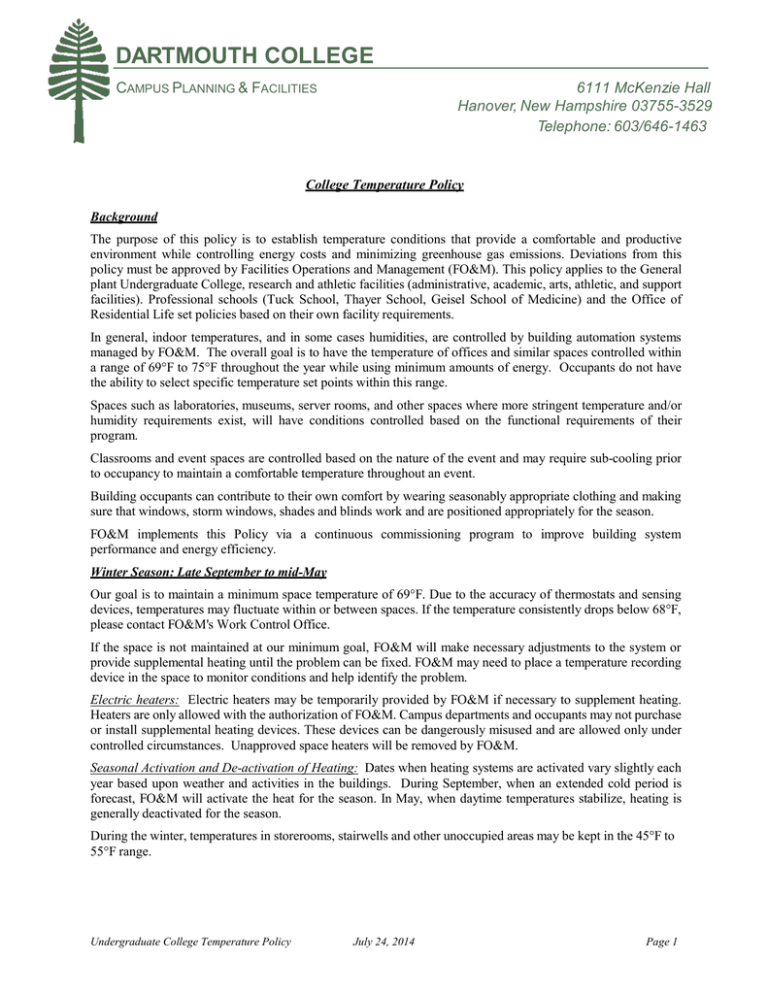
DARTMOUTH COLLEGE CAMPUS PLANNING & FACILITIES 6111 McKenzie Hall Hanover, New Hampshire 03755-3529 Telephone: 603/646-1463 College Temperature Policy Background The purpose of this policy is to establish temperature conditions that provide a comfortable and productive environment while controlling energy costs and minimizing greenhouse gas emissions. Deviations from this policy must be approved by Facilities Operations and Management (FO&M). This policy applies to the General plant Undergraduate College, research and athletic facilities (administrative, academic, arts, athletic, and support facilities). Professional schools (Tuck School, Thayer School, Geisel School of Medicine) and the Office of Residential Life set policies based on their own facility requirements. In general, indoor temperatures, and in some cases humidities, are controlled by building automation systems managed by FO&M. The overall goal is to have the temperature of offices and similar spaces controlled within a range of 69°F to 75°F throughout the year while using minimum amounts of energy. Occupants do not have the ability to select specific temperature set points within this range. Spaces such as laboratories, museums, server rooms, and other spaces where more stringent temperature and/or humidity requirements exist, will have conditions controlled based on the functional requirements of their program. Classrooms and event spaces are controlled based on the nature of the event and may require sub-cooling prior to occupancy to maintain a comfortable temperature throughout an event. Building occupants can contribute to their own comfort by wearing seasonably appropriate clothing and making sure that windows, storm windows, shades and blinds work and are positioned appropriately for the season. FO&M implements this Policy via a continuous commissioning program to improve building system performance and energy efficiency. Winter Season: Late September to mid-May Our goal is to maintain a minimum space temperature of 69°F. Due to the accuracy of thermostats and sensing devices, temperatures may fluctuate within or between spaces. If the temperature consistently drops below 68°F, please contact FO&M's Work Control Office. If the space is not maintained at our minimum goal, FO&M will make necessary adjustments to the system or provide supplemental heating until the problem can be fixed. FO&M may need to place a temperature recording device in the space to monitor conditions and help identify the problem. Electric heaters: Electric heaters may be temporarily provided by FO&M if necessary to supplement heating. Heaters are only allowed with the authorization of FO&M. Campus departments and occupants may not purchase or install supplemental heating devices. These devices can be dangerously misused and are allowed only under controlled circumstances. Unapproved space heaters will be removed by FO&M. Seasonal Activation and De-activation of Heating: Dates when heating systems are activated vary slightly each year based upon weather and activities in the buildings. During September, when an extended cold period is forecast, FO&M will activate the heat for the season. In May, when daytime temperatures stabilize, heating is generally deactivated for the season. During the winter, temperatures in storerooms, stairwells and other unoccupied areas may be kept in the 45°F to 55°F range. Undergraduate College Temperature Policy July 24, 2014 Page 1 Summer Season: Mid-May to Late September Air Conditioned Spaces: In buildings with central air conditioning systems, space temperatures will range between 75°F and 69°F. Due to the accuracy of sensing devices, and/or humidity control requirements, temperatures may fluctuate within or between spaces. Buildings with reheat systems may experience space temperatures lower than 75°F. While this may appear inefficient, it is a result of system design and is less expensive than heating spaces up to 75°F. If temperatures should rise above 78°F or drop below 68°F for an extended period, please contact FO&M's Work Control Office. Non-Air Conditioned Spaces: In non-air conditioned spaces, occupants will need to rely on ventilation from fans and open windows to maintain reasonable working conditions. During periods of high heat and humidity, individuals will have to cope as best they can with temporarily uncomfortable working conditions. During these periods, managers are urged to consider turning off unnecessary lights and electronic equipment, relaxing the dress code, adjust working hours and making other adjustments if possible. Supplemental Air Conditioning Units: Departments may contact FO&M to request seasonal installation of freestanding or window air conditioning units. Supplemental free standing units provide temperature relief but often do not perform consistently under high humidity conditions. Departments will be responsible for paying for the unit, seasonal installation and removal costs, an energy surcharge, and any electrical upgrade required for the unit. Freestanding units are typically installed on an annual basis from late May - early June and removed from mid-September to mid-October. Due to safety and permitting concerns, departments are not allowed to install supplemental air conditioning units. If a department is interested in this program, please contact Work Control for further information. Unoccupied Period Temperatures: Temperatures in offices and common spaces may be allowed to drift outside the 69°F to 75°F range during unoccupied periods. Unoccupied temperature ranges will be evaluated, set, and controlled by FO&M to ensure that space temperatures do not drift excessively and that they are back within normal range by the time of scheduled occupancy. Frequent reasons for temperature complaints: Windows: Regardless of the season, one of the most frequent causes of temperature complaints is a window or storm window that is left open. If you find that your space is uncomfortable, please check the window and storm window to ensure that it is closed. If it is open, please close the windows and allow an hour for the system to adjust. If the window cannot be closed, please contact FO&M's Work Control at 6-2508 or at work.control.office@dartmouth.edu. Office Layout: In many cases, FO&M responds to calls and finds office furniture, books, or boxes blocking radiators or fan coil units impacting the ability of the systems to deliver heat or cooling. Please keep these devices clear of furniture, books and equipment. In older buildings, individuals seated adjacent to large windows during the winter may experience a radiant cooling effect, making them feel uncomfortable regardless of the temperature in the space. Summary If you have questions about how your particular building operates and how the controls are set up, please email facilities.operations.and.managment@dartmouth.edu. A representative from the Engineering Department will respond to your inquiry and meet with you to explain the systems in your building. If heating or cooling systems are not performing adequately, please contact FO&M's Work Control at 6-2508 or at work.control.office@dartmouth.edu. Undergraduate College Temperature Policy July 24, 2014 Page 2 DARTMOUTH COLLEGE CAMPUS PLANNING & FACILITIES 6111 McKenzie Hall Hanover, New Hampshire 03755-3529 Telephone: 603/646-1463 Berry Sports Center Burnham Soccer Facility Davis Varsity House Floren Varsity House Leverone Field House Memorial Stadium Scully/Fahey Field Thompson Arena College Facilities 1, 3, 5 Rope Ferry Road 11 Rope Ferry Road - Billings Lee 37 & 50 Dewey Field Road 7 Rope Ferry Road - Dicks House Infirmary Baker Berry Library & Carson Hall Bartlett Hall Black Family Visual Arts Center Blunt Alumni Center Burke Chemistry Carpenter Hall Choate House Class of 1978 Life Sciences Center Class of 53 Dining Commons Collis Student Center Dartmouth Hall Electron Microscope Building Fairbanks North Fairbanks South Fairchild Physical Sciences Hallgarten Hall Hood Annex Hood Museum Hopkins Center Kemeny Hall/Haldeman Center McNutt Hall Moore Psychology Building Murdough Center Parker House Parkhurst Hall Reed Hall Robinson Hall Rockefeller Center for the Social Sciences Rollins Chapel Sanborn House Shattuck Observatory Sherman House Silsby Hall Steele Hall Sudikoff Laboratory for Computer Science Thornton Hall Webster Cottage Webster Hall - Rauner Library Wentworth Hall Wilder Laboratory Wilson Hall Winifred Raven House Athletic Facilities Alexis Boss Tennis Center Alumni Gymnasium Undergraduate College Temperature Policy July 24, 2014 Page 3
